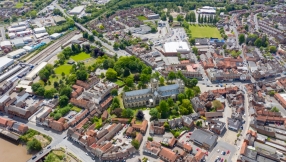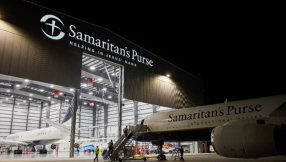Christians React as Blair Announces Departure from Office
|PIC1|Blair told Cabinet of his plans to resign on Thursday morning before making the announcement in a speech to party members in his Sedgefield constituency.
According to the official spokesman for the Prime Minister, Blair was praised during the Cabinet meeting by his successor Gordon Brown for his "unique achievements" and "unique leadership".
Speaking in his Sedgefield constituency, Blair admitted that his Government had not always lived up to high expectations but said he had felt very lucky to lead "the greatest nation on earth", reports the BBC.
The Archbishop of York, Dr John Sentamu, issued a statement on Thursday in response to Blair's announcement.
"I fundamentally disagreed with Tony Blair over the invasion of Iraq - which I saw as a breach of international law - but disagreement is part of the free and fair society which he has endeavoured to uphold during his time in office," he said.
"Tony Blair always welcomed what he termed "prophetic wisdom" from the Church on matters of state, even where such wisdom took the form of criticism or disagreement.
"Such disagreement should not detract from many of the remarkable things Tony Blair has achieved in office, not least among which was the peace settlement in Northern Ireland, where he ensured that past prejudices and failures were not allowed to get in the way of constructive dialogue and peace.
The Moderator of the General Assembly of the Church of Scotland, the Rt Rev Dr Alan McDonald, praised Blair on his departure, saying his efforts in Northern Ireland should be a particular source of pride: "Tony Blair's achievement in leading the United Kingdom for ten years is remarkable.
"Though the ever-widening gap between rich and poor, the attachment to American foreign policy, and the decision in favour of a new generation of nuclear weapons are all matters of great regret, I would rather concentrate on positives.
"The provision of undreamt of resources for education and the health service, and the speed with which the promise of devolved government was delivered in Scotland and Wales, should be a source of pride for him.
"Above all, history should remember him for the peace process in Northern Ireland."
The Catholic Agency for Overseas Development also commented on Blair's announcement to depart from office in June, saying that his Government had delivered on aid promises but still failed to bring in justice.
Repeated campaign pledges of global leadership, on trade in particular, "had taken second place to defending the economic status quo".
"The Blair Government has delivered generosity, but not justice," said CAFOD. "In areas of national policy where it has the unilateral power to effect change, the Government has delivered increased aid and worked to use it more effectively.
"Yet, ten years after Blair took office, the challenges of development remain daunting: 5,000 children are still dying every day from drinking dirty water and a billion people are still living in extreme poverty."
It added, "The challenge for the next prime minister will be to act at home and abroad by putting global justice at the heart of negotiations on climate change, trade and corruption - even when it hurts."
A chorus of tributes to Blair's successes during his decade in power have poured in from other senior leaders including deputy leadership contender Peter Hain and former Labour leader Neil Kinnock.
Lord Kinnock said in an interview with BBC Radio 4's Today programme that, "The one word that has to be associated with Tony is 'winner'.
"Not just of the unprecedented succession of three elections won by the Labour Party with large majorities, but also a winner because of his utter insistence and his endurance in Northern Ireland."
He said, however, that Blair's legacy would be "certainly shadowed, probably in the short term obscured" by the "great tragedy" of the war in Iraq.
Blair, an Anglican who occasionally attends Mass with his Catholic wife, Cherie, was recently criticised for involving Britain in the war on Iraq in a Church of England report, which said the Government's actions had only radicalised British Muslims and fuelled the terrorist movement.
The Archbishop of Canterbury also said he should have prayed with US President George W Bush on whether to invade Iraq, saying that had the two leaders done so, they might have received a different answer from the one they expected.
Many Christians will regard Blair's departure with mixed feelings. He praised the contribution of Christian and other faith groups in society, and often encouraged them to do more, but, despite being an Anglican, always professed that politics and religion should be kept separate.
In 2005, he told a group of evangelical Christians in London, "I do not want to end up with an American-style of politics with us all going out there beating our chest about our faith.
"Politics and religion - it is not that they do not have a lot in common, but if it ends up being used in the political process, I think that is a bit unhealthy."
Most recently, the new Sexual Orientation Regulations left many Christians feeling as though they were being pushed out of the public square by the Government, after it steadfastly refused to include a clause exempting faith-based groups from the gay rights laws on grounds of conscience.
He was a firm supporter of faith schools, however, and voiced his firm support on numerous occasions for the continued contribution of Christians in education. And despite his strong will to keep religion out of politics, he remains one of the most publicly Christian Prime Ministers in Britain for more than a hundred years.
He said on Thursday that it was up to others to decide whether he had made mistakes, but said he had always done what he thought was "right", the BBC reports.
"I may have been wrong. That's your call.
"But believe one thing if nothing else, I did what I thought was right for our country. And I came into office with high hopes for Britain's future, and, you know, I leave it with even higher hopes for Britain's future."
In conclusion, he said: "Actually I've been lucky and very blessed. And this country is a blessed nation.
"The British are special - the world knows it, in our innermost thoughts we know it. This is the greatest nation on earth."













